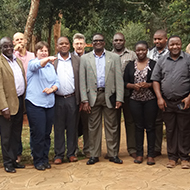
Researchers are celebrating progress made in eradicating peste des petits ruminants (PPR) virus globally.
PPR is a severe gastrointestinal and respiratory disease of sheep, goats and wildlife. Fatal in up to 90 per cent of cases, the condition threatens the livelihood of farmers across Africa, Asia and the Middle-east. Concerns have also been raised about its impact on biodiversity and its effect on women in particular.
According to the Food and Agriculture Organization of the United Nations (FAO), the number of outbreaks of PPR has fallen by two-thirds in recent years, raising hopes for the goal of global eradication by 2030.
Researchers at the RVC say that the key to this eradication will be understanding the role of wildlife in transmission and ensuring that no persistence in wildlife infection complicates vaccine implementation in livestock.
Working with its global partners, including the Pirbright Institute, CIRAD France, University of Glasgow, the College’s research has already led to several important findings, including:
- identifying a wide host range for the virus in African buffalo, antelope species and wild suids across East Africa
- determining estimated and true PPR virus antibody prevalence statistic for certain species in specific ecosystems
- establishing evidence for spillover of the virus from small domestic ruminants to wildlife
- confirming the nature and patterns of disease in small livestock in East Africa
- providing important science for determining eradication policy and methods for surveillance and monitoring the disease.
Richard Kock, chair in wildlife health and emerging diseases at the RVC, said: “The PPR virus has now become the focus of the international community for the elimination of the second animal virus of economic and environmental significance by 2030 and our work has been fundamental in establishing the new global research network and strategy for this process.”
Image (C) RVC.



 The Veterinary Medicines Directorate (VMD) is inviting applications from veterinary students to attend a one-week extramural studies (EMS) placement in July 2026.
The Veterinary Medicines Directorate (VMD) is inviting applications from veterinary students to attend a one-week extramural studies (EMS) placement in July 2026.